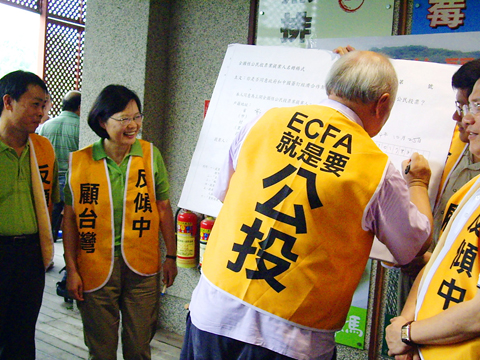The Chinese government’s plan to sign an economic cooperation framework agreement (ECFA) with Taiwan is aimed not just at bolstering cross-strait commerce, but at stifling the Taiwanese independence movement, a former US official said in Taipei on Friday.
Susan Shirk, former deputy assistant secretary of state during the administration of former US president Bill Clinton, made the remarks when asked about President Ma Ying-jeou’s (馬英九) eagerness to sign an ECFA.
Under Ma, the government has proposed signing an ECFA with China, saying that it is urgently needed for Taiwan because a free-trade agreement between China and ASEAN will take effect next year, which would further marginalize Taiwan and cripple its trade-dependent economy.

PHOTO: CNA
The Democratic Progressive Party (DPP), however, has warned that the agreement would jeopardize Taiwan’s sovereignty, make it too economically dependent on China and lead to an influx of Chinese capital and goods.
At the press event on Friday, Shirk said that she believed increasing trade across the Taiwan Strait could greatly benefit Taiwan, but added that Taiwan should never underestimate the risk and urged the nation to further investigate Beijing’s motives behind the ECFA.
Taiwan has an “efficient government” with regular, democratic elections, she said. Therefore, if the public is worried that China might eventually absorb Taiwan’s economy, the people should express their concern with their ballots.
Shirk did not elaborate whether she meant the issue should be put to a referendum.
In her book titled China: The Fragile Superpower, Shirk wrote about the disparity of wealth in China and the Chinese public’s increased desire for democracy as the economy booms.
Shirk on Friday said that as the international community witnesses the rise of Beijing, it is important to be mindful of China’s “fragile interior,” which would make Chinese authorities more stringent and harder to predict.
To quell any suspicion or worries from the international community, China’s diplomacy could be described as more flexible, she said. But despite the changes, China still has many problems.
In related news, DPP Chairperson Tsai Ing-wen (蔡英文) urged the public to sign a petition asking the government to hold a referendum on the ECFA issue during a visit to Kaohsiung City yesterday.
Tsai said her party estimated that the proposed economic treaty would affect around 4 million people, especially laborers and farmers in central and south Taiwan.
“The public must stand up and say no to Ma, who is following China and moving toward unification,” she said.
The DPP has said it plans to collect 100,000 signatures by the end of next month in the first stage of its plan to call a referendum.
Tsai said that the party hopes to collect at least 6,600 signatures in Kaohsiung City.
The Referendum Act (公投法) stipulates that the signatures of 0.5 percent of eligible voters — approximately 80,000 — must be collected to apply for a referendum.
In the second stage, 5 percent of eligible voters — approximately 800,000 — must sign the petition before the Referendum Review Committee will sanction the proposed referendum.
Ma has voiced his opposition to a referendum on the ECFA issue, saying that the proposed agreement was not a political issue.

Alain Robert, known as the "French Spider-Man," praised Alex Honnold as exceptionally well-prepared after the US climber completed a free solo ascent of Taipei 101 yesterday. Robert said Honnold's ascent of the 508m-tall skyscraper in just more than one-and-a-half hours without using safety ropes or equipment was a remarkable achievement. "This is my life," he said in an interview conducted in French, adding that he liked the feeling of being "on the edge of danger." The 63-year-old Frenchman climbed Taipei 101 using ropes in December 2004, taking about four hours to reach the top. On a one-to-10 scale of difficulty, Robert said Taipei 101

Nipah virus infection is to be officially listed as a category 5 notifiable infectious disease in Taiwan in March, while clinical treatment guidelines are being formulated, the Centers for Disease Control (CDC) said yesterday. With Nipah infections being reported in other countries and considering its relatively high fatality rate, the centers on Jan. 16 announced that it would be listed as a notifiable infectious disease to bolster the nation’s systematic early warning system and increase public awareness, the CDC said. Bangladesh reported four fatal cases last year in separate districts, with three linked to raw date palm sap consumption, CDC Epidemic Intelligence

US climber Alex Honnold left Taiwan this morning a day after completing a free-solo ascent of Taipei 101, a feat that drew cheers from onlookers and gained widespread international attention. Honnold yesterday scaled the 101-story skyscraper without a rope or safety harness. The climb — the highest urban free-solo ascent ever attempted — took just more than 90 minutes and was streamed live on Netflix. It was covered by major international news outlets including CNN, the New York Times, the Guardian and the Wall Street Journal. As Honnold prepared to leave Taiwan today, he attracted a crowd when he and his wife, Sanni,

Two Taiwanese prosecutors were questioned by Chinese security personnel at their hotel during a trip to China’s Henan Province this month, the Mainland Affairs Council (MAC) said yesterday. The officers had personal information on the prosecutors, including “when they were assigned to their posts, their work locations and job titles,” MAC Deputy Minister and spokesman Liang Wen-chieh (梁文傑) said. On top of asking about their agencies and positions, the officers also questioned the prosecutors about the Cross-Strait Joint Crime-Fighting and Judicial Mutual Assistance Agreement, a pact that serves as the framework for Taiwan-China cooperation on combating crime and providing judicial assistance, Liang